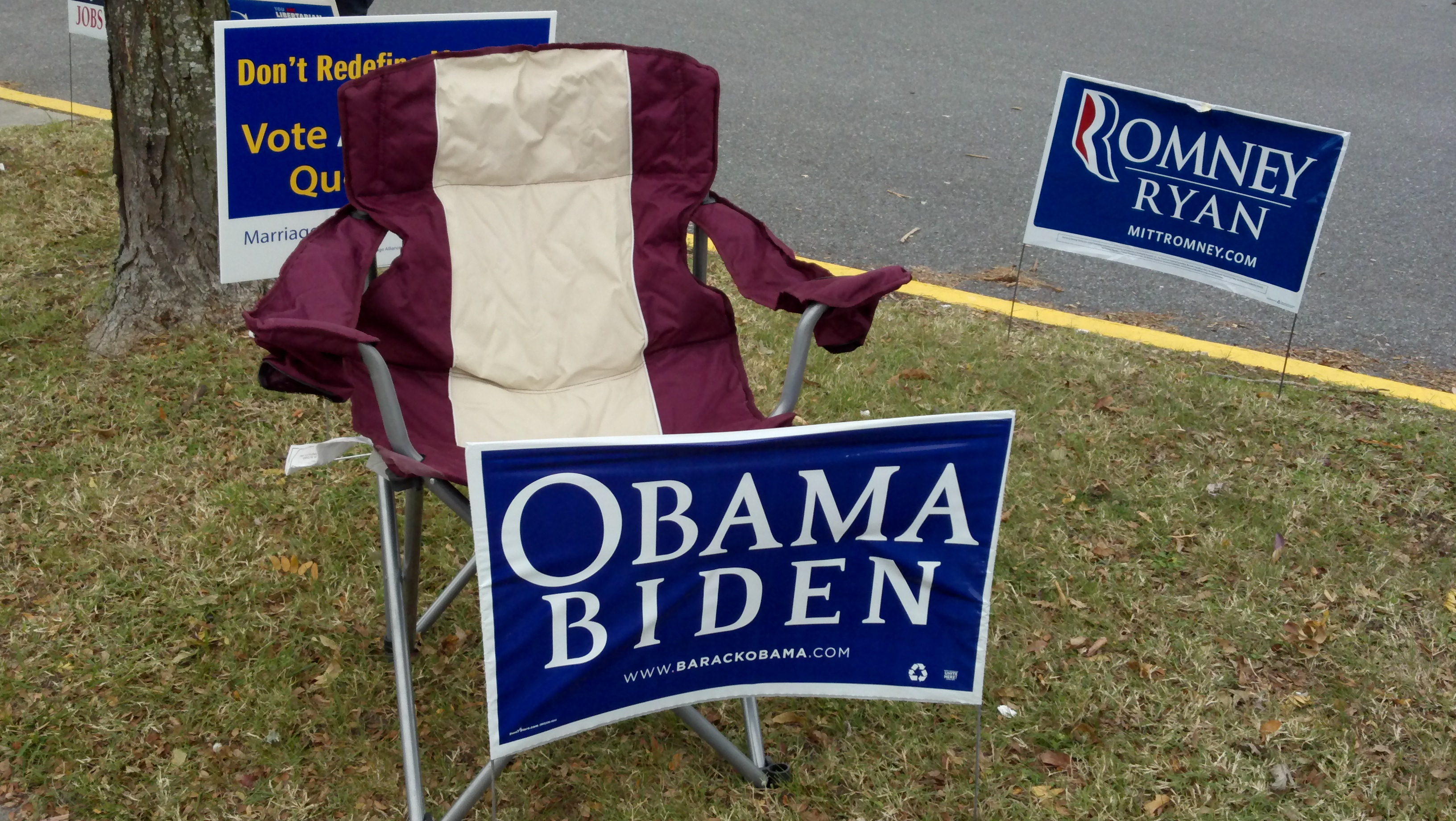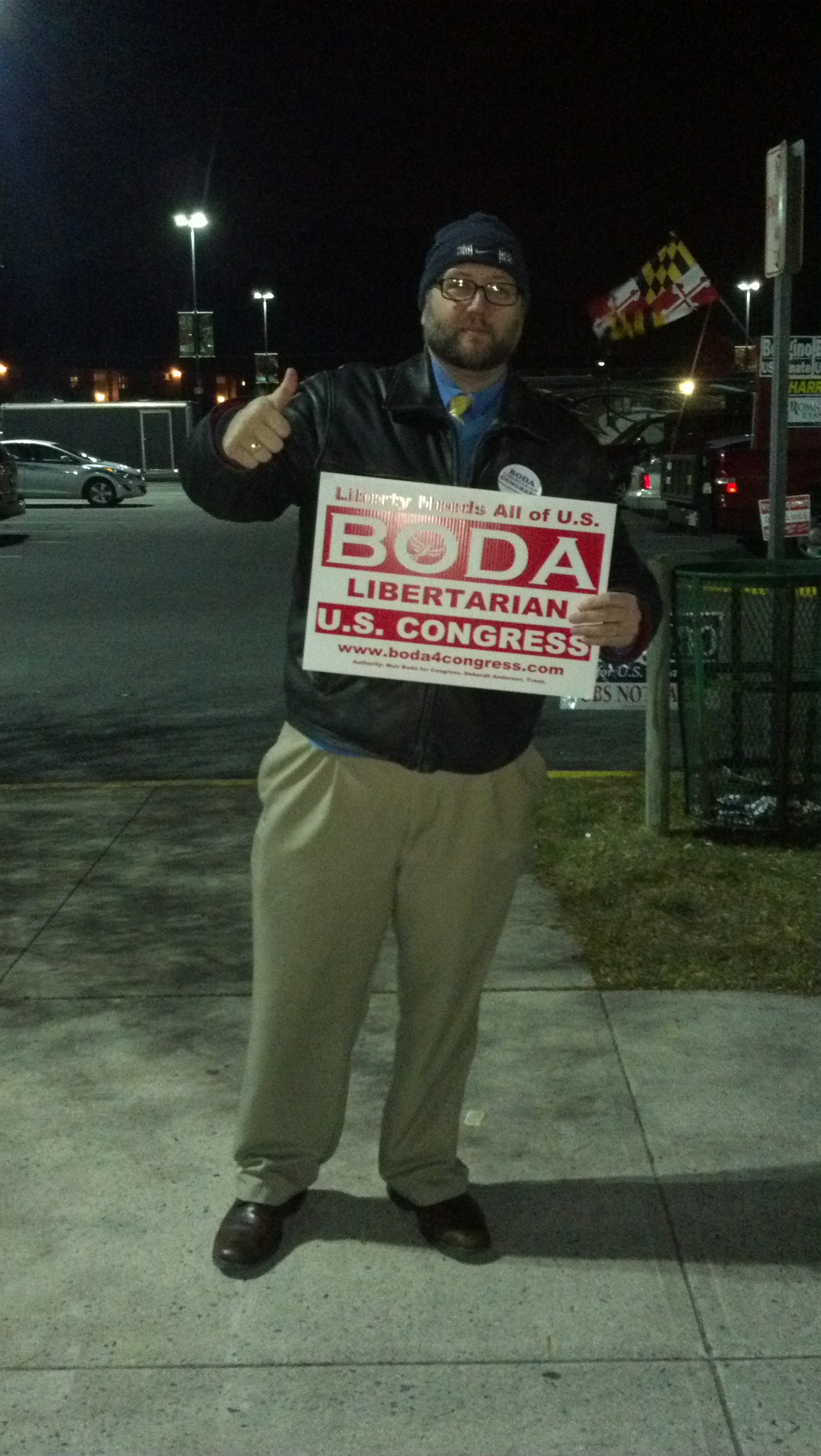
Yesterday was a good day at the Doubletree Hotel in Annapolis.
Somehow I had managed to miss the first two renditions of Turning the Tides, but when this year’s date was announced I pounced on making my way into the event this year. Part of this was the opportunity to network with over 200 of the state’s finest conservative minds, but part of it was a guest list dotted with nationally recognized speakers.
Unlike the many GOP conventions I had attended in the same building, there were no hospitality suites on Friday night. Turning The Tides was a one-day affair, which started with a breakfast I unfortunately missed. But I was set up on bloggers’ row next to a variety of state and local bloggers (including my “biggest fan” Jackie Wellfonder,) which gave me the opportunity to live-Tweet the event throughout.
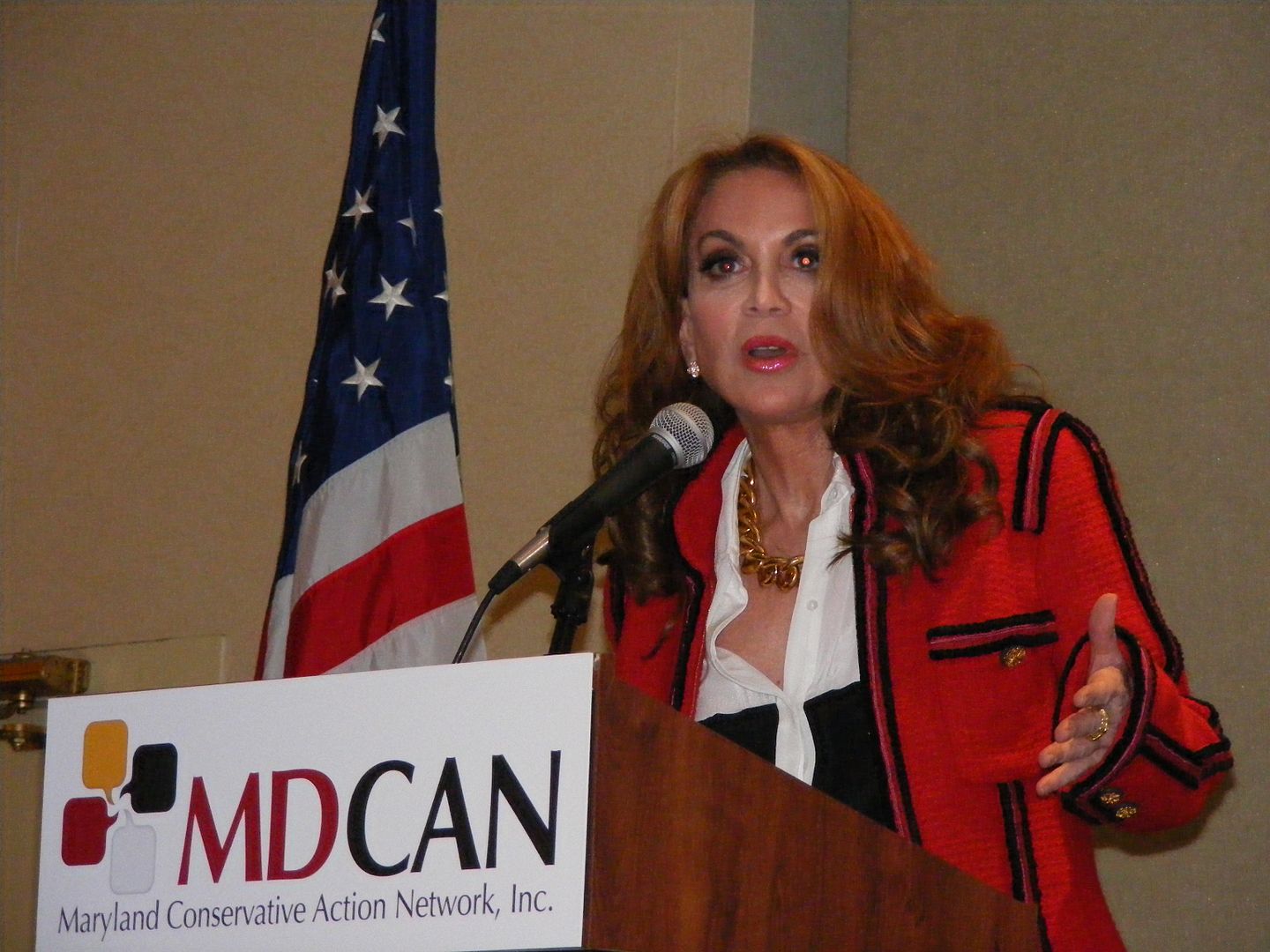
The Tweets didn’t take long to build up steam once we dispensed with the preliminaries and heard from our first guest speaker, the exceptionally quotable Pamela Geller. Most people know Geller from her website Atlas Shrugs, which briefly covered TTT here, but she has been a tireless leader in the ongoing battle against radical Islam. (If you follow the link you can also see the extent of the crowd in the conference.)
Pamela praised the conference attendees, who she termed “smeared, defamed, and marginalized for standing in defense of freedom” by the “enemedia.” Her key point was defending the freedom of speech, without which “peaceful men have no alternative but to turn to violence.”
“Evil is made possible by the sanction you give it,” she continued, “Withdraw your sanction.” She also called Delegate Nic Kipke, who ignored a boycott call by the pro-Islamic group CAIR, a “rare bird in today’s environment (because) truth is the new hate speech, and just telling the truth is an extreme act.”
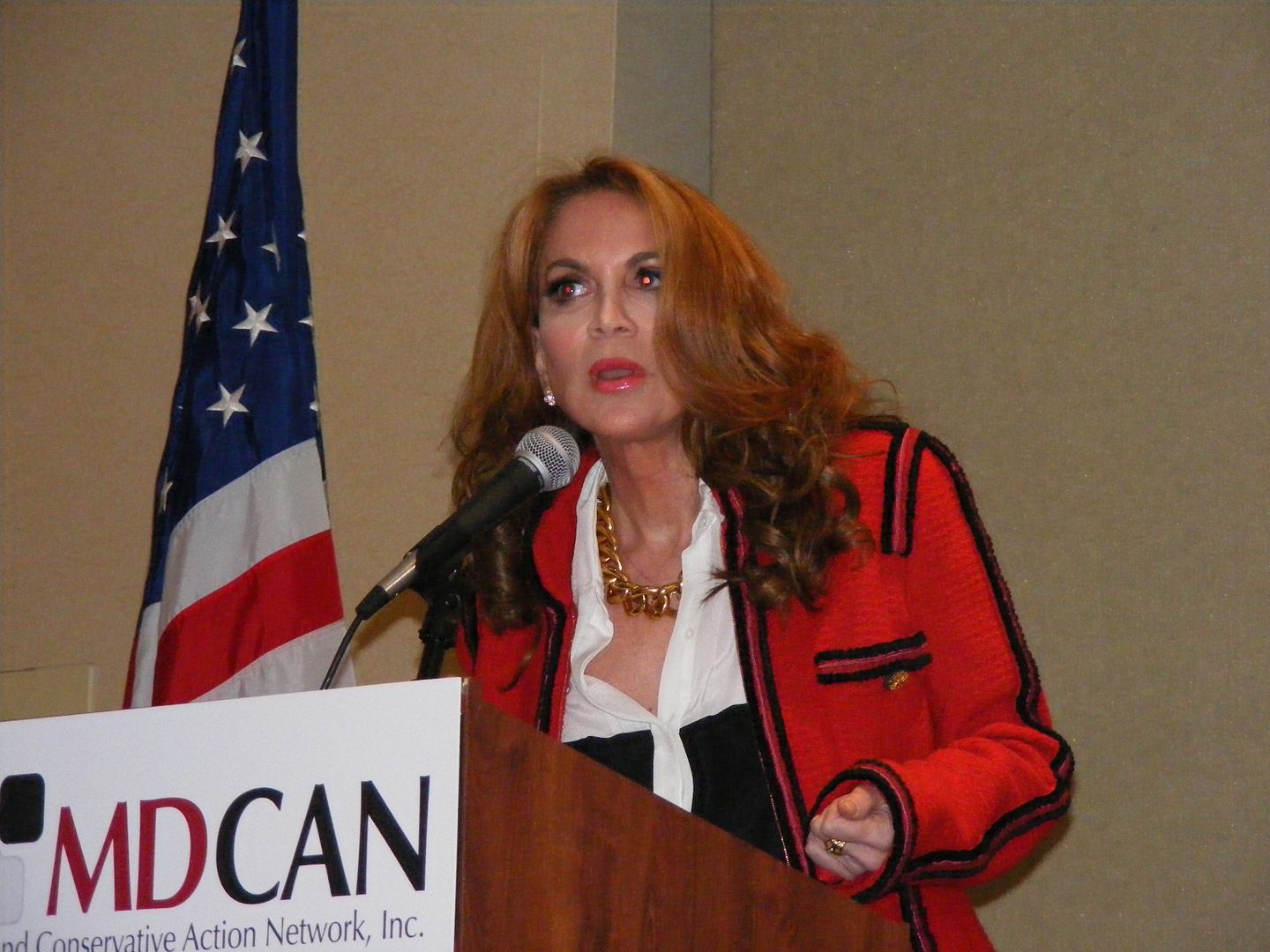
She went on to explain how she purchased ad space on the New York subway in response to anti-Israel ads, but was rebuffed because “the word ‘savage’ was demeaning. So I had to sue…and I won on all points. Freedom of speech protects all ideas.” Ten of her ads were destroyed within an hour, which she termed “a physical manifestation of this war on free speech.”
She also detailed her battle against the Ground Zero mosque, telling us the images of 9-11 have been “embargoed” because they offend Islamic sensitivities. “You defeated that mosque (when) everyone was against you.”
Yet there is a “sea change” occurring in attitude, she said, citing how comments used to be highly stacked against her, but now run strongly in her favor.
“No war has ever been won on defense,” she continued. She begged us to use our “spheres of influence” to fight this fight. “Silence is sanction.” We have to contest acceptance of Shari’a, since Mohammed “ain’t my prophet.”
Geller finished by taking a number of great questions on anti-Shari’a legislation, a nuclear-armed Iran, and the “cultural war” of politics which will include the sale of Current TV to Al Jazeera.
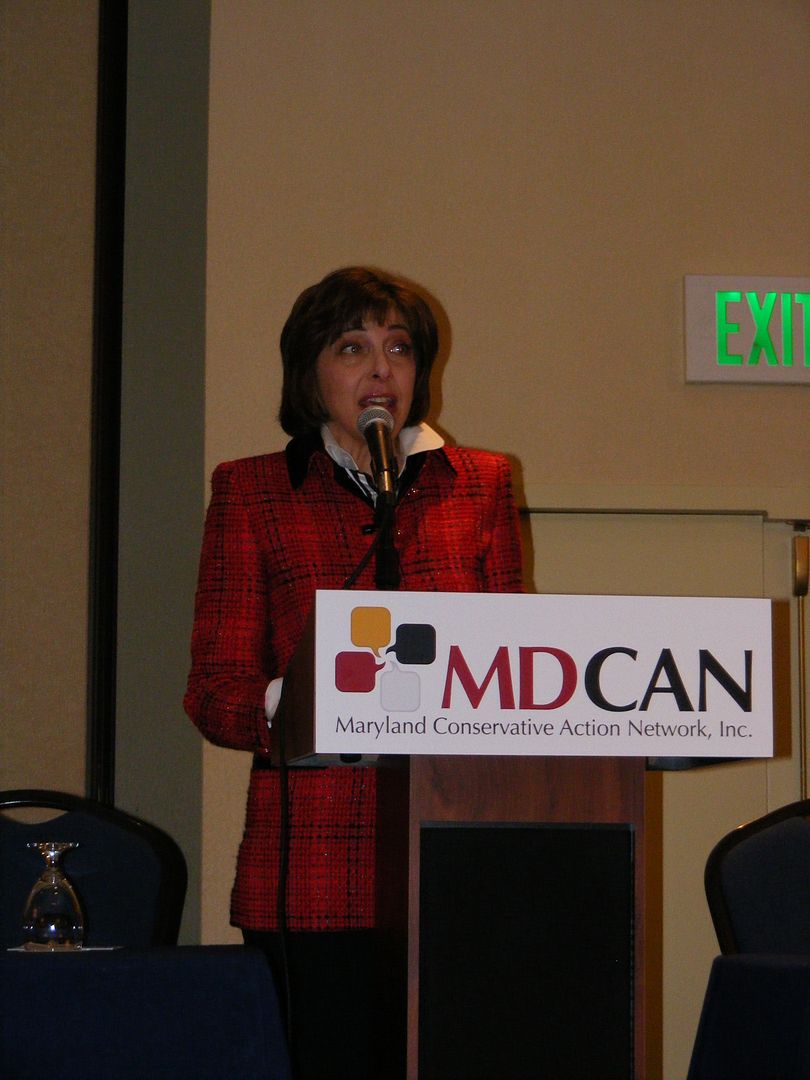
The next speaker, author Diana West, touched on the Current TV sale in her opening remarks as well, as well as the foreign ownership of Fox News. But her remarks centered on her choice in foreign policy, of which she remarked “I’m debuting it here” – with one option to follow the “neoconservative” foreign policy based on universal values. “This has been a disaster.” The other side was a more libertarian-style idea: “I subscribe to ‘coming home America,'” said West, but they suffer the same flaw in that negotiations with Islamic nations “worse than fruitless (and) dangerous to our liberty.”
It begins with love of country, said West, and we would keep the allies with the closest philosophical views. But it would require one radical change: “It would…require leaving the United Nations.” (That was perhaps her best applause line, which she said did far better here than the “blank stares” she gets at the Washington Times.)
It would also be designed with the interests of the American people in mind. “We should fight for the American people.” Instead, we’ve begun to negotiate with terrorists, defend Shari’a-based regimes, and tell our military to look askance at “absolute outrages against American beliefs and sensibilities” in Afghanistan and other Islamic nations.
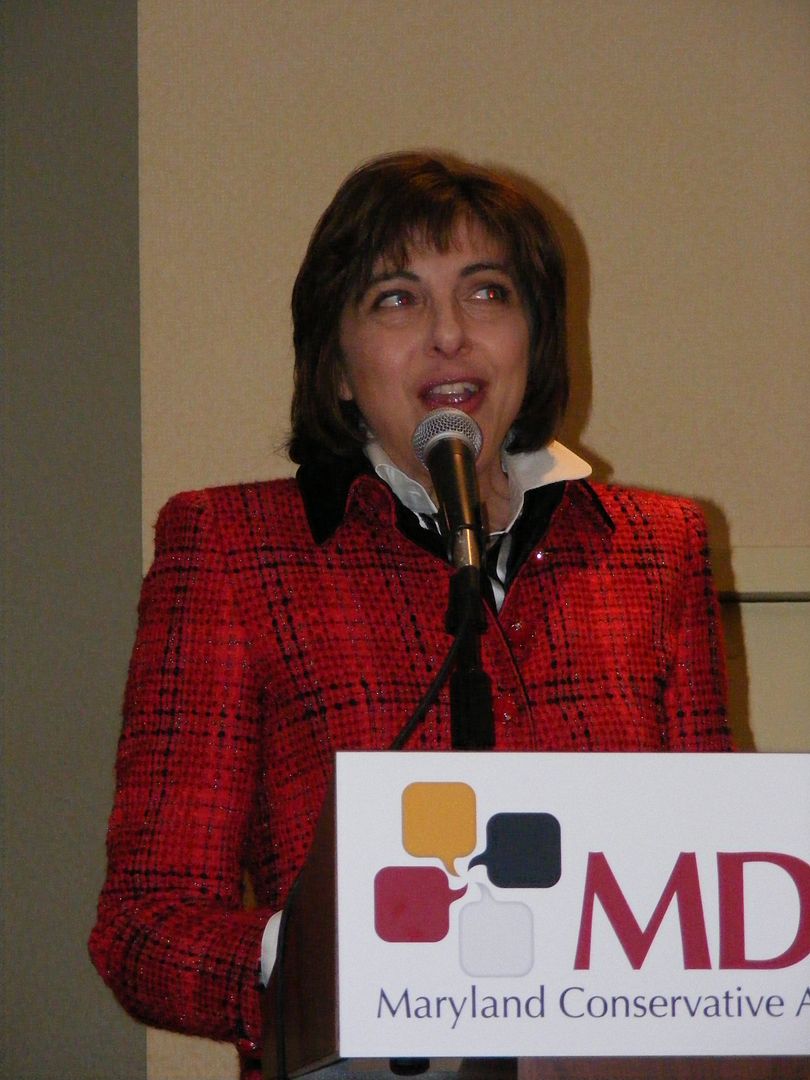
“And why? Why – nobody’s answered this – why did the Obama administration lie for two weeks that lawfully-protected free speech in America caused the Benghazi attacks?,” asked West. “Why didn’t Mitt Romney ask any of these questions?”
The key question, said West, was whether we were fighting abroad to protect liberty at home. “American interests have been blown to smithereens” by leadership, Diana asserted. Our borders are “essentially open” while National Guard troops protect Afghan citizens. Moreover, this is a contradiction to American values because 3/4 of Hispanics want bigger government while just 2/5 of the population at large feels the same.
West outlined a number of changes she would make, from a secretive foreign policy without much Congressional oversight over “a President run amok.”
“I have not seen terrible damage from Wikileaks,” she continued. “I have seen much corruption and lies on the part of our public officials.”
“I don’t believe that’s the way a republic functions. That needs to change,” said Diana. The war of our next generation is not the one we’re fighting, but a war against Shari’a. “Liberty is imperiled right here in our back yard,” said West, who also called the Islamization of Europe “the great uncovered story of our time.”
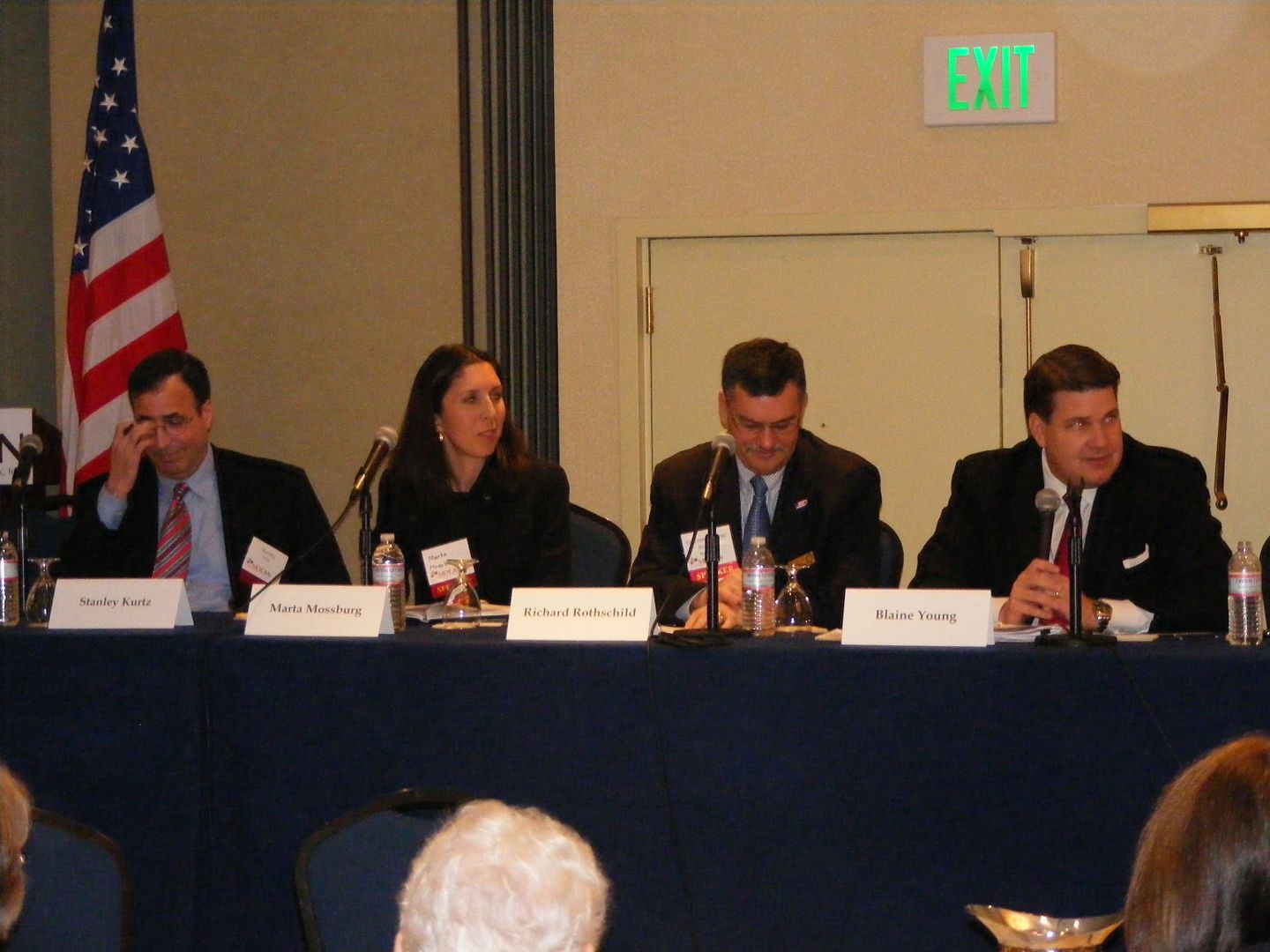
Our first group discussion panel, moderated by writer and columnist Marta Mossburg, featured a solid bank of speakers: Frederick County Commission president (and 2014 gubernatorial candidate) Blaine Young, writer and author Stanley Kurtz, and Carroll County Commissioner Richard Rothschild.
Young started out in a jovial manner, joking about the Geller controversy and about once being a Democrat: “Well, everybody can be misinformed, ill-advised, and brainwashed.” But he turned more serious about his assigned topic, telling those gathered “I’m a very pro-property rights person, always have been…property rights is where I’m at.”
Stemming from the very first attack on property rights, zoning, which began in the 1920s and has been accepted in most places – Young pointed out Garrett County is an unzoned exception – Blaine turned to the state as it stands and told us “we’ve never seen an attack like this on the state level,” referring to PlanMaryland. “This is a tool, to slow down the rural areas for growth.”
But Young’s most brilliant point was equating things done “for the Bay” with laws passed “for the children.” As I Tweeted:
@blaineyoung – “it’s for the Bay” = “it’s for the children”. That somehow sounds familiar to me. #TTT13
— Michael Swartz (@ttownjotes) January 12, 2013
Indeed, I have mentioned this a number of times over the years – here’s one. Great minds think alike?
Stanley Kurtz quickly asserted that “President Obama is not a fan of the suburbs.” As a community organizer, those who mentored Obama had the main goal was to abolish them because they were drawing away tax money rightfully belonging to the cities. To that end, Obama “has been a huge supporter” of that movement. “Barack Obama wants to redistribute the wealth of America’s suburbs to the cities,” said Stanley. He identified the philosophy as the “regional equity movement.”
But among the federal programs imposed on the state, the Sustainable Communities Initiative is perhaps the one affecting Maryland the most. “Nobody pays attention to the Sustainable Communities Initiative,” despite the fact Baltimore was a “regional planning grant” recipient. It’s a program where the federal government pays for regional planning, such as PlanMaryland but on a smaller scale. The goal, though, is to make the receipt of federal aid contingent on adopting these plans, much like schools which accept federal money do so with stipulations placed on them.
And while everyone has heard of Agenda 21, not so many are familiar with the workings of the Smart Growth movement, concluded Kurtz. “Conservatives are missing where the real threat is coming from,” warned Kurtz, “We haven’t studied the home-grown (regional equity) movements.”
But Rothschild was the most strident speaker. “The question of the War on Rural Maryland begs a bigger question: why does this happen?” Richard went on to postulate that it happens “because we let them.”
“Those people that disrespect the Bible and the Constitution are invariably the ones who know the least about either of them,” said Rothschild. “We (conservatives) are abdicating our responsibilities at all levels of government to do what needs to be done.”
“Being a Constitutionalist requires practice,” opined Richard. Elected officials need to ask themselves not just ‘what would Jesus do,’ but a second question: what would Jefferson do?
Elected officials aren’t trained to uphold their oath of office and the Constitution. “We’re not thinking the right way.” As an example, he stood alone in his county in an effort to nullify SB236. A further test was when he went to the recent Maryland Association of Counties meeting and asked six random county officials about what they would do if an order was passed down to confiscate guns in their county.
“Three of them said they don’t know, and the other three said they would resign from office,” Richard charged. “Not one said they would nullify, interpose, or engage their locally elected sheriff to defend their citizens’ Constitutional rights.” That was the fundamental problem.
Richard even spoke on comments he made regarding the SB236 Tier IV opt-out provision proposed right here in Wicomico County. (The original post is on the Conduit Street blog.) “They do this because we let them…we are tolerating the intolerable.”
“I don’t negotiate one-sided contracts…we shouldn’t even engage,” Richard opined, “Constitutional rights are non-negotiable.” Rothschild vowed to work with the Institute on the Constitution to put together a training course on how to uphold their oath of office.
“(Liberal groups are) going to spend a fortune to try to defeat like Blaine and people like me during the next election because they hate us,” Richard concluded to a raucous standing ovation. And he’s right.
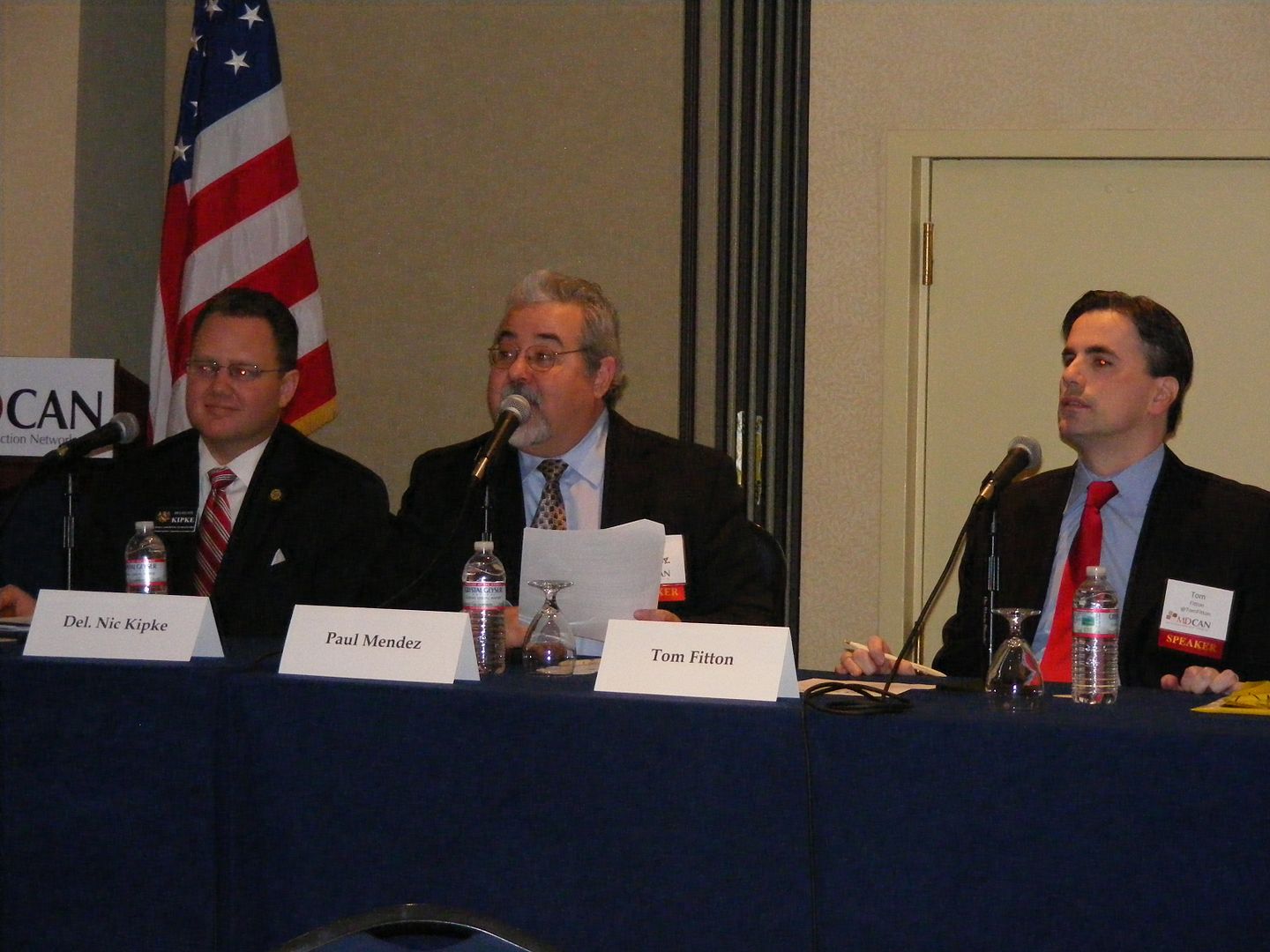
The final session of the morning discussed the “War on Jobs,” with Judicial Watch President Tom Fitton and Delegate Nic Kipke, who was introduced as a member of the Maryland Health Reform Coordinating Council. Fitton focused on illegal immigration while Kipke naturally looked at Obamacare. “Nic knows more about Obamacare than the legislators who voted for it in 2010,” noted moderator Paul Mendez of Help Save Maryland.
Fitton described his work with Help Save Maryland and other legal groups interested in upholding the idea that workplaces should have workers here legally. But that fight began with Montgomery County Community College giving in-state tuition to illegal aliens. “They thought they could get away with it,” noted Fitton. A nice thing about Maryland law, he continued, was that it has a provision allowing citizens standing to sue the government to prevent illegal expenditures of funds.
Hundreds of millions of dollars have been given to illegal aliens who can’t work, stated Tom, “Maryland is a magnet for illegal immigration, and the impact on jobs is obvious.” Most affected were the construction trades where the majority of contractors, who are law-abiding, are “competing against crooks.”
“It’s a racket” to keep certain politicians in office, Fitton charged. And speaking of Maryland politics specifically, Tom also alleged there was corruption behind the passage of the ballot initiatives. “(O’Malley) was using his office to promote the approval of the referenda,”
Tom also had kudos for Delegate Neil Parrott, who he’d worked with on the ballot issues, calling him an important figure in Maryland democracy. “We’ve been proud to stand with him,” Fitton beamed.
The lesson here, Fitton said, was that the illegal immigration issue is not automatically a turnoff to Hispanics. He cited polling data which said, in the most recent election, 40% of Hispanics “agreed with the idea of an Arizona-style approach to illegal immigration.” It was 13 points more than Romney received among Hispanics at large. “This is a majority issue for us,” Fitton claimed.
“We’re really in a battle for our lives in a lot of ways,” Kipke opened. “It used to be we were in a battle for our rights, but we’re also in a battle for our way of life.”
He went through a couple examples of the “trainwreck” of Obamacare, one being the fact that the age breakdowns – lumping everyone from age 21 to 60 in a group – will create a spike in rates making insurance unaffordable to young people. (One estimate pegs the additional cost as anywhere from $280 to $400 a month.) “It’s almost designed to fail,” said Kipke.
The second problem is that the exchanges will essentially all offer the same programs – health insurance has to be approved by and purchased from the state – generally these are the “richest packages available.” At this time, Maryland is one of just eight states with an exchange in place. “If Obama is successful, health insurance will be purchased through the state, and it will be the state design,” Kipke said.
The Delegate urged us to use him and Delegate Parrott as a conduit to the General Assembly. “If you have access to technology, you should see the stuff that goes on. Bring a camera, we’ll tell you where to stand and we’ll put you up in front of the next Delegate who embraces socialism. We’d love to get that on video.”
That brought us to the lunch break. While most of us grabbed a quick bite to eat, there was a lot going on both inside and outside the lobby.
On the inside, a total of fifteen groups had information tables and other items set up. Here are a few of those:


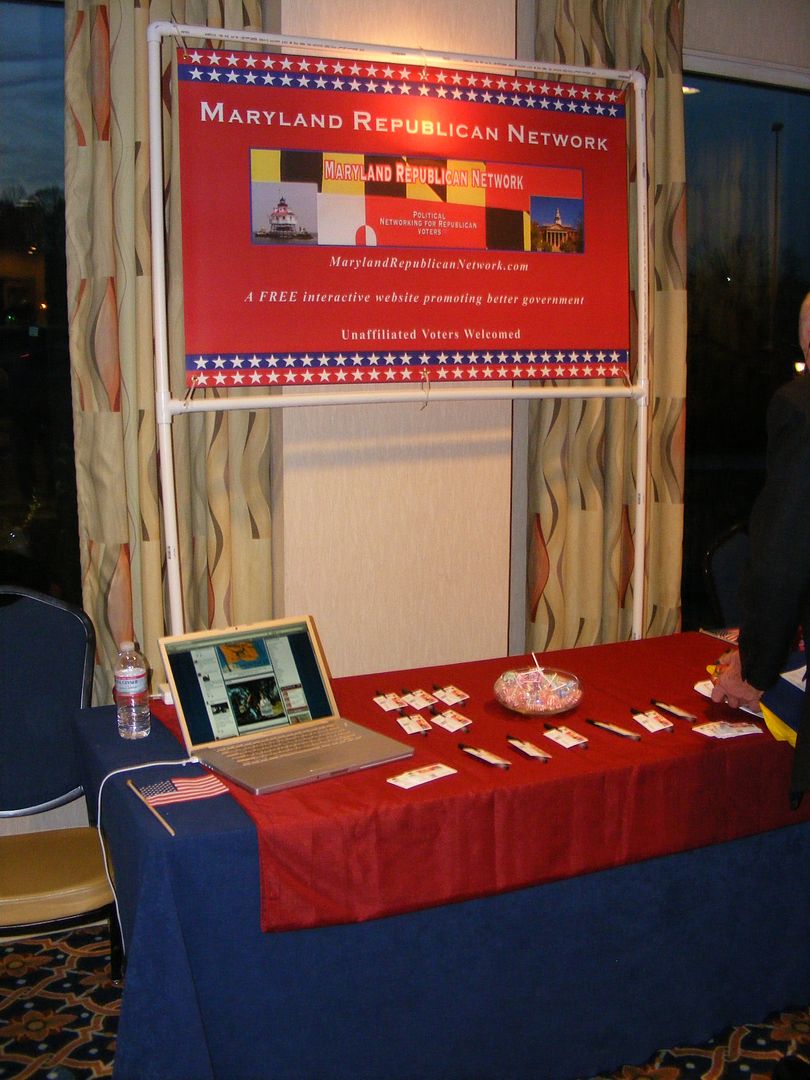
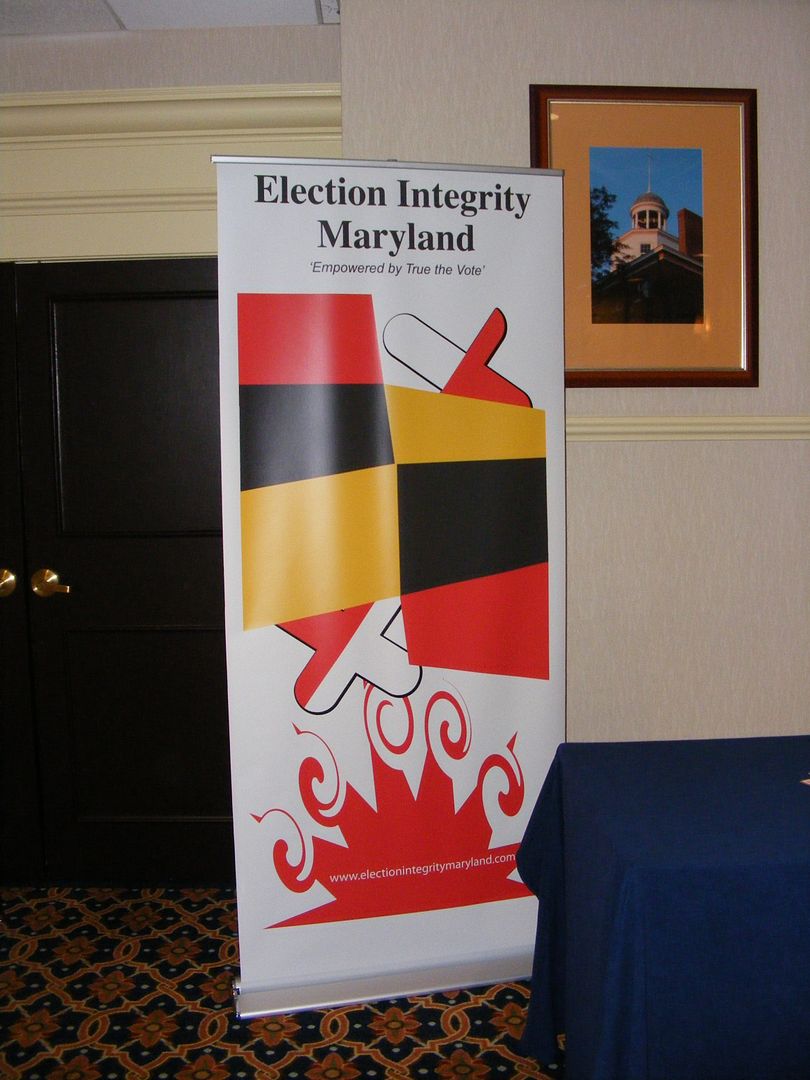
In order, these were Accuracy in Media, Defend Life, Maryland Republican Network, and Election Integrity Maryland. Other groups in attendance were the Franklin Center (sponsor of Bloggers’ Row), the Red Maryland Network – which did a live broadcast from the lobby – Institute on the Constitution, Americans for Fair Taxation, Montgomery County Republicans, Stop Agenda 21, Help Save Maryland, the Leadership Institute, Maryland Legislative Watch, Constitutional Conservatives for Maryland PAC, and Conservative Victory PAC.
There were also merchants, with event T-shirts and Breitbart design shirts on sale.

We also had a chance to meet some of the speakers and purchase their books.
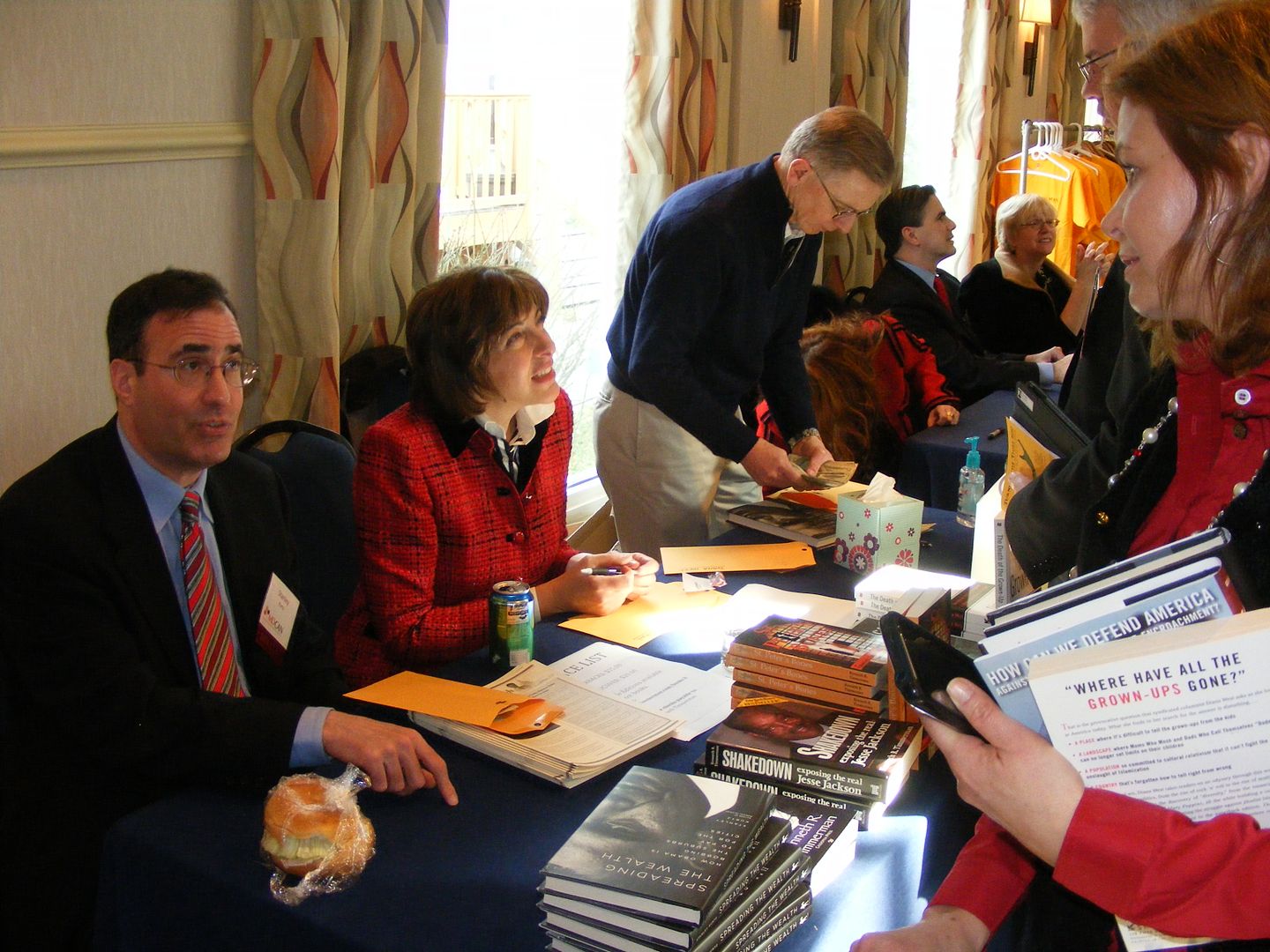
From left to right, represented were Stanley Kurtz, Diana West, Pamela Geller (crouched), and Tom Fitton. Dun Scott (husband of organizer Cathy Trauernicht) is standing in the center; thanks to Ann Corcoran for the correction.
As I noted, there was also action outside the building. The CAIR protest of Pamela Geller finally showed up two hours after she finished speaking. (Photo by and courtesy of Jackie Wellfonder.)

Yet the ten protesters got media attention. If it weren’t for them, I doubt the TV stations would have showed up.
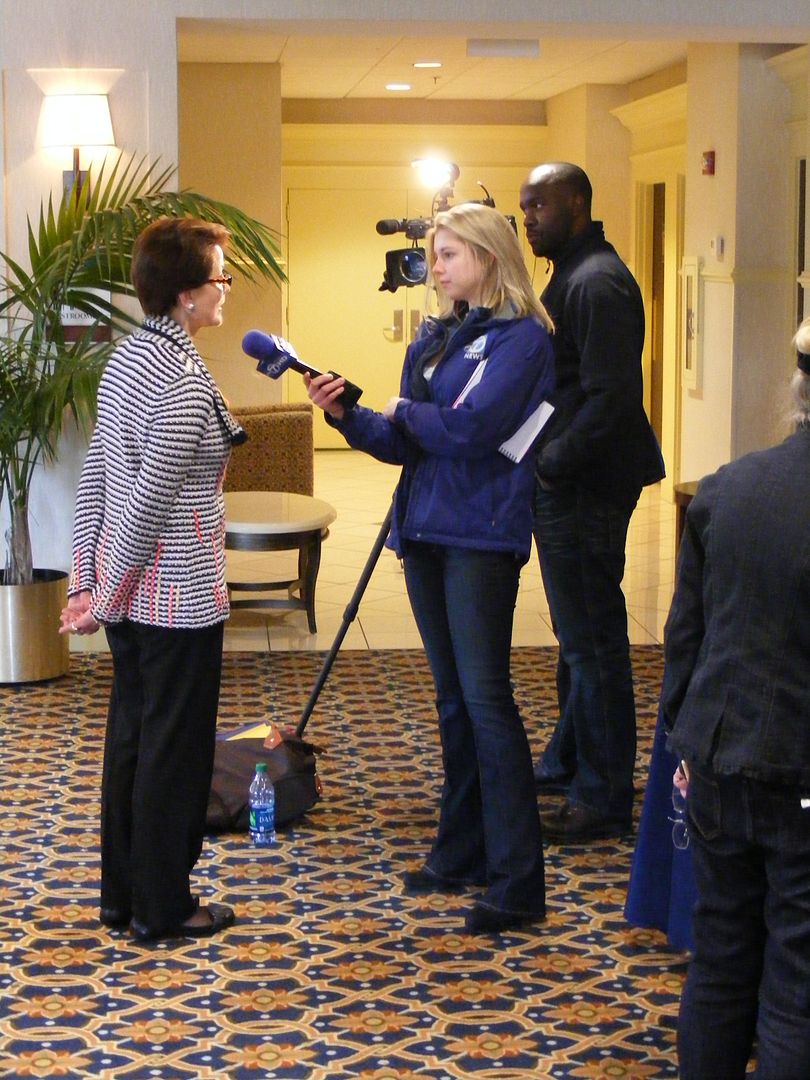
So that’s where we stood as lunch concluded. In part 2 I’ll cover the four intriguing seminars which occurred afterward and the closing remarks by Jim Rutledge.



